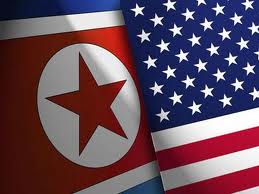A top US military commander said Tuesday he favored shooting down a North Korean missile only if it threatened the United States or Washington’s allies in the region.
 A top US military commander said Tuesday he favored shooting down a North Korean missile only if it threatened the United States or Washington's allies in the region.
A top US military commander said Tuesday he favored shooting down a North Korean missile only if it threatened the United States or Washington's allies in the region.
When asked by lawmakers if he supported knocking out any missile fired by North Korea, Admiral Samuel Locklear, head of US Pacific Command, said: "I would not recommend that."
But the four-star admiral told the Senate Armed Services Committee he would "certainly recommend" intercepting an incoming North Korean missile "if it was in defense of our allies" or the United States.
Amid widespread speculation North Korea could be preparing a missile launch, Locklear also said he was confident the US military would be able to detect quickly where any missile was headed.
"It doesn't take long for us to determine where it's going and where it's going to land," said Locklear, who oversees American forces in the Asia-Pacific region.
The US military has a powerful radar in Japan to help track a possible missile launch as well as naval ships in the area equipped with anti-missile weaponry. Japan and South Korea also have their own missile defense systems.
Given North Korea's repeated violations of UN Security Council resolutions that bar the pursuit of long-range ballistic missiles and nuclear weapons, Pyongyang represents "a clear and direct threat to US national security and regional peace and stability," Locklear said.
North Korea has issued dire threats that it could stage an attack on the United States with nuclear weapons, but experts doubt it is able to do so.
Both the admiral and lawmakers voiced concern that possible miscalculation could trigger an unintended war, and Locklear acknowledged the situation was "volatile."
To try to manage tensions, a new joint military plan between the United States and South Korea was designed to carefully counter North Korea's provocations but "without unnecessary escalation," he said.
With Pyongyang issuing almost daily threats against Washington and its allies, the United States was struggling to discern the motives and behavior of the Stalinist state's young leader, Kim Jong-Un, he said.